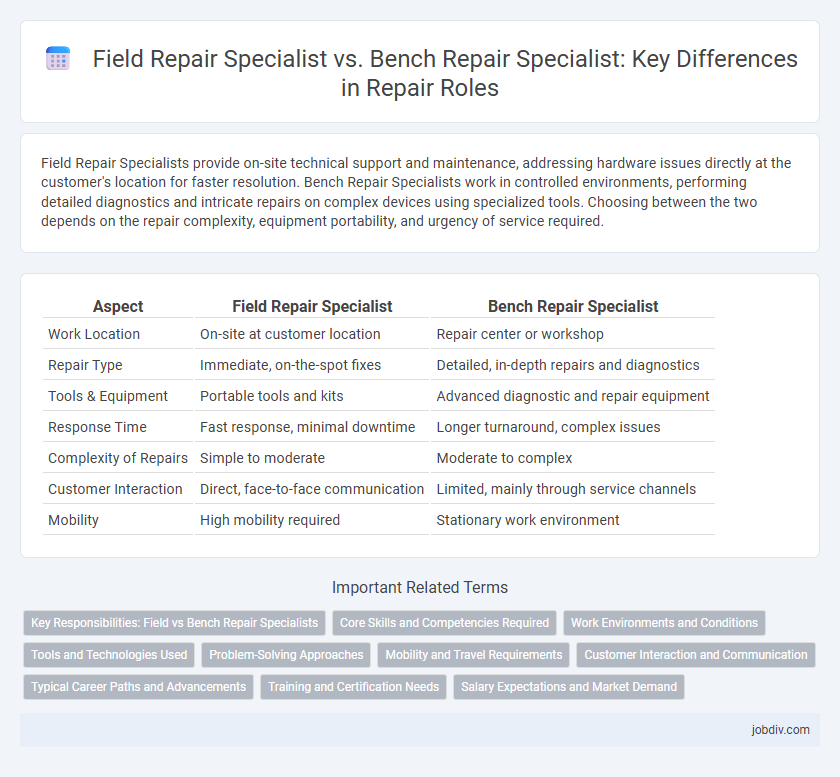Field Repair Specialists provide on-site technical support and maintenance, addressing hardware issues directly at the customer's location for faster resolution. Bench Repair Specialists work in controlled environments, performing detailed diagnostics and intricate repairs on complex devices using specialized tools. Choosing between the two depends on the repair complexity, equipment portability, and urgency of service required.
Table of Comparison
| Aspect | Field Repair Specialist | Bench Repair Specialist |
|---|---|---|
| Work Location | On-site at customer location | Repair center or workshop |
| Repair Type | Immediate, on-the-spot fixes | Detailed, in-depth repairs and diagnostics |
| Tools & Equipment | Portable tools and kits | Advanced diagnostic and repair equipment |
| Response Time | Fast response, minimal downtime | Longer turnaround, complex issues |
| Complexity of Repairs | Simple to moderate | Moderate to complex |
| Customer Interaction | Direct, face-to-face communication | Limited, mainly through service channels |
| Mobility | High mobility required | Stationary work environment |
Key Responsibilities: Field vs Bench Repair Specialists
Field Repair Specialists handle on-site diagnostics, troubleshooting, and repairs to minimize equipment downtime at client locations, ensuring rapid response and operational continuity. Bench Repair Specialists perform detailed disassembly, component-level repairs, and testing within a controlled workshop environment, focusing on complex electronics and precision instruments. Both roles require deep technical expertise but differ in repair context, with field specialists emphasizing mobility and customer interaction, while bench specialists prioritize intricate repairs and quality assurance.
Core Skills and Competencies Required
Field Repair Specialists excel in troubleshooting and repairing equipment on-site, requiring strong diagnostic skills, adaptability to various environments, and effective communication with clients. Bench Repair Specialists focus on detailed component-level repairs within a controlled workshop setting, demanding precision, technical expertise in electronics or mechanical systems, and proficiency with specialized tools. Both roles require a solid understanding of repair protocols, safety standards, and the ability to interpret technical manuals accurately.
Work Environments and Conditions
Field Repair Specialists perform maintenance and troubleshooting tasks on-site, often working in diverse and sometimes challenging environments such as industrial plants, remote locations, or client facilities. Bench Repair Specialists operate within controlled workshop settings, utilizing specialized tools and equipment to conduct detailed diagnostics and repairs on electronic components or hardware. The nature of their work environments significantly influences their workflow, safety protocols, and the type of tools required for efficient repair operations.
Tools and Technologies Used
Field Repair Specialists utilize portable diagnostic tools such as handheld multimeters, thermal imaging cameras, and mobile device analyzers to perform on-site troubleshooting and repairs in varied environments. Bench Repair Specialists rely on advanced stationary equipment including oscilloscopes, precision soldering stations, and high-resolution microscopes to conduct detailed inspections and component-level repairs in controlled lab settings. Both roles leverage specialized software for system diagnostics and firmware updates, but the mobility and adaptability of tools differentiate the field specialist's workflow from the bench specialist's precision-focused toolkit.
Problem-Solving Approaches
Field Repair Specialists excel in problem-solving by diagnosing and resolving issues on-site using adaptive techniques and immediate resourcefulness, minimizing operational downtime. Bench Repair Specialists focus on detailed, controlled troubleshooting and component-level repairs in a workshop setting, leveraging specialized tools and diagnostic equipment for precision fixes. Both roles require deep technical knowledge, but Field Specialists prioritize rapid assessment and improvisation, while Bench Specialists emphasize methodical analysis and exact restoration.
Mobility and Travel Requirements
Field Repair Specialists require extensive travel to client locations, providing on-site troubleshooting and repairs, which demands high mobility and adaptability to different environments. Bench Repair Specialists work primarily in a controlled workshop setting, focusing on device diagnostics and repairs without the need for frequent travel. The choice between the two roles depends on preference for hands-on, location-independent work versus a stationary, lab-based repair environment.
Customer Interaction and Communication
Field Repair Specialists directly engage with customers on-site, providing immediate troubleshooting and personalized service that enhances satisfaction and trust. Bench Repair Specialists typically handle repairs in a controlled workshop environment, communicating with customers primarily through remote updates or phone calls, which may delay response time and reduce real-time interaction. Effective communication skills in Field Repair roles contribute to quicker issue resolution and stronger customer relationships compared to the more transactional communication in Bench Repair settings.
Typical Career Paths and Advancements
Field Repair Specialists often progress toward roles in technical sales, customer support management, or become trainers due to their hands-on experience and direct client interaction. Bench Repair Specialists typically advance into quality control, diagnostic engineering, or supervisory positions within repair facilities, leveraging their in-depth equipment knowledge and precision skills. Both career paths offer growth opportunities in specialized certifications and leadership roles, but Field Specialists usually encounter broader mobility across industries.
Training and Certification Needs
Field Repair Specialists require extensive training in on-site diagnostic techniques, safety protocols, and hands-on repair skills to address diverse equipment issues under varying environmental conditions. Bench Repair Specialists focus on in-depth component-level troubleshooting and utilize advanced diagnostic tools, necessitating certifications in electronics, soldering, and precision repair methodologies. Both roles demand continuous certification updates to keep pace with evolving technology standards and ensure repair quality.
Salary Expectations and Market Demand
Field Repair Specialists typically command higher salary expectations due to their on-site troubleshooting skills and the increasing demand for immediate technical support across various industries. Bench Repair Specialists, while essential for in-depth diagnostics and equipment refurbishment, generally receive lower compensation reflecting steady but more localized market demand. Trends indicate growing employer preference for versatile Field Repair Specialists capable of handling diverse repair environments, influencing salary growth in this segment.
Field Repair Specialist vs Bench Repair Specialist Infographic

 jobdiv.com
jobdiv.com